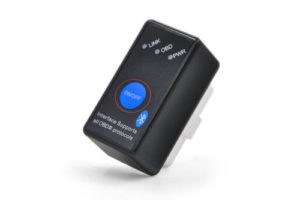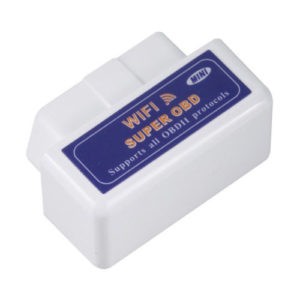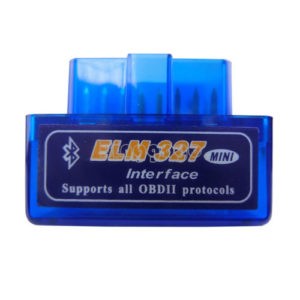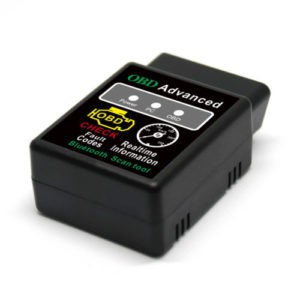Obdii Bluetooth Plug-in adapters offer a convenient way to access your car’s diagnostic data, but choosing the right one is crucial for a smooth experience. CARDIAGTECH.NET understands the importance of reliable automotive tools, so we’ve compiled this comprehensive guide to help you select the best OBDII Bluetooth adapter for your needs. Discover our expert recommendations and unlock the power of vehicle diagnostics.
1. Understanding OBDII Bluetooth Plug-Ins
OBDII (On-Board Diagnostics II) Bluetooth plug-in adapters are small devices that connect to your car’s OBDII port. They wirelessly transmit vehicle data to your smartphone or tablet via Bluetooth, allowing you to diagnose issues, monitor performance, and even customize certain settings. This technology has changed how car enthusiasts and professional mechanics approach vehicle maintenance, offering a blend of convenience and detailed insight into a vehicle’s operational status.
1.1 What is OBDII?
OBDII is a standardized system that provides access to data from a vehicle’s engine control unit (ECU). The Environmental Protection Agency (EPA) mandated it for all cars sold in the United States after 1996. The protocol aims to monitor and control emissions-related components, but it also provides access to a wealth of other vehicle data.
1.2 The Role of Bluetooth Plug-Ins
Bluetooth plug-ins act as a bridge between your car’s OBDII port and your mobile device. By plugging into the OBDII port, these devices can request and receive diagnostic information, which is then transmitted wirelessly to a paired device. This eliminates the need for bulky scan tools or wired connections, making vehicle diagnostics more accessible than ever.
1.3 Benefits of Using OBDII Bluetooth Adapters
- Portability: Small and easy to carry, making them ideal for on-the-go diagnostics.
- Convenience: Wireless connectivity eliminates tangled cables and allows for remote monitoring.
- Cost-Effectiveness: Often more affordable than dedicated scan tools, providing a budget-friendly option for vehicle diagnostics.
- Data Logging: Many apps allow you to record and analyze vehicle data over time, helping identify trends and potential issues.
- Customization: Some adapters and apps allow you to customize vehicle settings, such as disabling certain features or adjusting performance parameters.
2. Key Considerations When Choosing an OBDII Bluetooth Plug-In
Selecting the right OBDII Bluetooth plug-in requires careful consideration of several factors, including compatibility, features, and reliability. Here’s a detailed breakdown of the key aspects to evaluate.
2.1 Compatibility with Your Vehicle
Not all OBDII adapters work with all vehicles. Ensure the adapter you choose is compatible with your car’s make, model, and year. Check the adapter’s specifications or the manufacturer’s website for compatibility information. Some adapters may also support specific protocols or vehicle systems, such as CAN (Controller Area Network) or J1850.
2.2 Compatibility with Your Smartphone or Tablet
OBDII Bluetooth adapters use different Bluetooth versions, so it’s essential to choose one compatible with your smartphone or tablet’s operating system.
- iOS (iPhone/iPad): iOS devices typically support Bluetooth LE (4.0 and above), Wi-Fi, and Bluetooth MFi adapters. Classic Bluetooth adapters (versions 1.x, 2.x, 3.x) are generally not compatible due to iOS limitations.
- Android: Android devices support classic Bluetooth (versions 1.x, 2.x, 3.x), Bluetooth LE (4.0), and Wi-Fi adapters.
- Operating System
| Operating System | Supported Adapters |
|---|---|
| iOS | Bluetooth LE (4.0+), Wi-Fi, Bluetooth MFi |
| Android | Classic Bluetooth, Bluetooth LE, Wi-Fi |





2.3 Features and Functionality
OBDII Bluetooth adapters offer a range of features, so consider your needs and choose an adapter that provides the functionality you require.
- Basic Diagnostics: Reading and clearing diagnostic trouble codes (DTCs), viewing live sensor data, and performing emissions readiness tests.
- Advanced Diagnostics: Accessing manufacturer-specific codes, performing advanced system tests, and programming certain vehicle functions.
- Data Logging: Recording and analyzing vehicle data over time, including engine parameters, fuel consumption, and performance metrics.
- Customization: Adjusting vehicle settings, such as disabling certain features or calibrating sensors.
2.4 Reliability and Build Quality
The reliability of an OBDII Bluetooth adapter is crucial for accurate diagnostics and safe vehicle operation. Look for adapters from reputable brands with positive user reviews.
- Avoid Cheap Adapters: Inexpensive adapters may be unreliable, providing inaccurate data or even damaging your car’s ECU.
- Check User Reviews: Read reviews from other users to get an idea of the adapter’s performance and reliability.
- Consider Warranty: A warranty can provide peace of mind and protect you from potential defects.
2.5 Software and App Support
The software or app you use with your OBDII Bluetooth adapter is just as important as the adapter itself. Look for apps that are user-friendly, feature-rich, and compatible with your vehicle and adapter.
- App Compatibility: Ensure the app supports your adapter’s communication protocol and provides the features you need.
- User Interface: Choose an app with an intuitive and easy-to-navigate user interface.
- Data Visualization: Look for apps that offer clear and informative data visualization tools, such as graphs and charts.
- Customization Options: Some apps allow you to customize the dashboard, configure alerts, and create custom PIDs (parameter IDs).
- Updates and Support: Choose an app that is regularly updated and offers reliable customer support.
3. Recommended OBDII Bluetooth Plug-Ins by CARDIAGTECH.NET
Based on our extensive experience and user feedback, CARDIAGTECH.NET recommends the following OBDII Bluetooth plug-ins for their performance, reliability, and features.
3.1 OBDLink MX+
The OBDLink MX+ is a top-of-the-line adapter that offers exceptional performance and a wide range of features. It’s compatible with both iOS and Android devices and supports all OBDII protocols, as well as manufacturer-specific protocols.
- Features:
- High-speed data transfer
- Support for advanced diagnostics
- Bluetooth MFi compatibility for iOS
- Secure wireless communication
- Battery saver technology
- Pros:
- Excellent performance and reliability
- Wide range of features
- Compatible with iOS and Android
- Cons:
- Higher price point
3.2 OBDLink CX
The OBDLink CX is another excellent adapter from OBDLink, offering a balance of performance and affordability. It’s compatible with iOS and Android devices and supports Bluetooth LE for seamless connectivity. It stands out because of its Bimmercode compatibility.
- Features:
- Bluetooth LE connectivity
- Large memory buffer
- Support for advanced diagnostics
- Secure wireless communication
- Battery saver technology
- Pros:
- Excellent performance and reliability
- Bluetooth LE for iOS and Android
- Cons:
- Fewer features than the MX+
3.3 vLinker MC+
The vLinker MC+ is a popular adapter known for its reliability and compatibility with various vehicles and apps. It supports Bluetooth LE and is compatible with both iOS and Android devices.
- Features:
- Bluetooth LE connectivity
- Support for advanced diagnostics
- Firmware updates
- Compact design
- Pros:
- Good performance and reliability
- Bluetooth LE for iOS and Android
- Affordable price point
- Cons:
- Some users have reported issues with initial firmware versions. (easily fixable with firmware updates)
3.4 Vgate iCar Pro 2S
The Vgate iCar Pro 2S is a versatile adapter that supports both Bluetooth 2.0 and Bluetooth 4.0, making it compatible with a wide range of devices.
- Features:
- Bluetooth 2.0 and Bluetooth 4.0
- Compact design
- Support for most OBDII protocols
- Pros:
- Wide compatibility
- Affordable price point
- Cons:
- Firmware updates may be required for optimal performance
Recommended Adapters Table
| Adapter | Compatibility | Features | Pros | Cons |
|---|---|---|---|---|
| OBDLink MX+ | iOS, Android | High-speed, Advanced Diagnostics, Bluetooth MFi | Excellent Performance, Wide Range of Features, iOS/Android | Higher Price |
| OBDLink CX | iOS, Android | Bluetooth LE, Large Memory, Advanced Diagnostics | Excellent Performance, Bluetooth LE for iOS/Android | Fewer Features than MX+ |
| vLinker MC+ | iOS, Android | Bluetooth LE, Advanced Diagnostics, Firmware Updates | Good Performance, Bluetooth LE for iOS/Android, Affordable | Initial Firmware Issues (easily fixable with update) |
| Vgate iCar Pro 2S | iOS, Android | Bluetooth 2.0 & 4.0, Compact Design | Wide Compatibility, Affordable | Firmware Updates may be Required |
4. OBDII Bluetooth Plug-Ins to Avoid
While many OBDII Bluetooth plug-ins offer reliable performance, some are known for their unreliability, limited features, or potential to cause harm to your vehicle. CARDIAGTECH.NET recommends avoiding the following adapters.
4.1 xTool Adapters
xTool adapters are proprietary and only compatible with their software, limiting their versatility and usefulness with other OBDII apps.
4.2 Wired Adapters (USB, COM)
CARDIAGTECH.NET only supports wireless adapters, so wired adapters are not compatible with our software.
4.3 “Mini” Adapters
Adapters with “mini” in their name are often unreliable and prone to issues.
4.4 Cheap Adapters
Extremely low-priced adapters are likely to be of poor quality and may not function correctly.
4.5 Adapters with Specific MAC Addresses
Adapters with Bluetooth MAC addresses starting with 11:22:33 or 00:00:00 are often associated with unreliable performance.
4.6 KONNWEI Devices
While previously recommended, KONNWEI devices have experienced a decline in quality and are known to lose data packets.
4.7 “Micro Mechanic” Adapters
Many “Micro Mechanic” adapters stop working after a short period.
4.8 “THINMI.COM” Adapters
“THINMI.COM” adapters have limited support for ELM327 commands and may provide fake responses.
4.9 KUULAA Adapters
KUULAA adapters are generally not recommended due to their unreliability.
4.10 Specific Adapter Designs
Avoid adapters with the following design, as they are often of low quality:
5. Common Issues with “Bad” ELM327 Adapters
Using a low-quality ELM327 adapter can lead to various problems, ranging from minor inconveniences to serious vehicle damage. Here’s a detailed overview of the potential issues.
5.1 Non-Functionality
The adapter may not work.
5.2 Unstable Operation
The adapter may freeze after a few minutes, reboot spontaneously, or stop working under certain conditions (e.g., low or high temperatures, high humidity).
5.3 Limited Command Support
The adapter may only support a subset of the required control commands, even if it claims to support all commands.
5.4 Hard-Coded ECU Address
The adapter may be hard-coded to work with a standard ECU address, preventing communication with other ECUs in your car.
5.5 Limited Request/Response Length
The adapter may have a limit on the length of requests sent and responses received.
5.6 Data Loss
The adapter may lose data packets during transmission, resulting in incomplete or inaccurate information.
5.7 Data Distortion
The adapter may distort data during transmission, potentially leading to incorrect commands or readings.
5.8 Protocol Incompatibility
The adapter may only support a subset of the declared communication protocols, making it incompatible with certain vehicles.
5.9 On-Board Network Interference
The adapter may short-circuit or spam the on-board network with junk data, preventing the ECU from functioning correctly.
5.10 Issues with Coding and Service Functions
Using a low-quality adapter for coding and service functions can lead to data corruption or even damage to the ECU.
6. Step-by-Step Guide to Using an OBDII Bluetooth Plug-In
Using an OBDII Bluetooth plug-in is generally straightforward, but following these steps will ensure a smooth and successful experience.
6.1 Step 1: Plug in the Adapter
Locate the OBDII port in your car. It’s typically located under the dashboard on the driver’s side. Plug the OBDII Bluetooth adapter into the port.
6.2 Step 2: Pair with Your Device
Turn on your car’s ignition but do not start the engine. On your smartphone or tablet, enable Bluetooth and search for available devices. Select your OBDII adapter from the list of available devices. You may be prompted to enter a pairing code (usually “1234” or “0000”).
6.3 Step 3: Launch Your OBDII App
Launch your chosen OBDII app and connect to the adapter. The app may prompt you to select your vehicle’s make, model, and year.
6.4 Step 4: Start Diagnosing
Once connected, you can start diagnosing your car’s issues, viewing live data, or performing other functions supported by the app and adapter.
7. Understanding Search Intent
To better understand user needs, we’ve identified five key search intents related to OBDII Bluetooth plug-ins.
7.1 Informational: What is an OBDII Bluetooth plug-in?
Users searching with this intent want to understand what an OBDII Bluetooth plug-in is, how it works, and its benefits.
7.2 Comparative: Which OBDII Bluetooth plug-in is the best?
Users with this intent are looking for recommendations and comparisons of different OBDII Bluetooth plug-ins to make an informed decision.
7.3 Transactional: Where can I buy an OBDII Bluetooth plug-in?
These users are ready to purchase an OBDII Bluetooth plug-in and are looking for reputable retailers or online stores.
7.4 Diagnostic: How do I use an OBDII Bluetooth plug-in to diagnose my car?
Users with this intent want to learn how to use an OBDII Bluetooth plug-in to diagnose specific issues with their car.
7.5 Compatibility: Is this OBDII Bluetooth plug-in compatible with my car?
These users want to ensure that a specific OBDII Bluetooth plug-in is compatible with their vehicle’s make, model, and year.
8. FAQ About OBDII Bluetooth Plug-Ins
Here are some frequently asked questions about OBDII Bluetooth plug-ins.
8.1 What is an OBDII Bluetooth plug-in?
An OBDII Bluetooth plug-in is a device that connects to your car’s OBDII port and transmits vehicle data wirelessly to your smartphone or tablet via Bluetooth.
8.2 What can I do with an OBDII Bluetooth plug-in?
You can use an OBDII Bluetooth plug-in to diagnose vehicle issues, view live sensor data, perform emissions readiness tests, and customize certain vehicle settings.
8.3 Are OBDII Bluetooth plug-ins compatible with all cars?
Not all OBDII Bluetooth plug-ins are compatible with all cars. Check the adapter’s specifications or the manufacturer’s website for compatibility information.
8.4 Do I need a special app to use an OBDII Bluetooth plug-in?
Yes, you’ll need an OBDII app to connect to the adapter and view vehicle data. Choose an app that is compatible with your adapter and offers the features you need.
8.5 Are OBDII Bluetooth plug-ins safe to use?
Yes, OBDII Bluetooth plug-ins are generally safe to use, but it’s essential to choose a reliable adapter and avoid low-quality or potentially harmful devices.
8.6 Can an OBDII Bluetooth plug-in drain my car’s battery?
Some OBDII Bluetooth plug-ins can drain your car’s battery if left plugged in for extended periods. Look for adapters with battery saver technology or unplug the adapter when not in use.
8.7 How do I update the firmware on my OBDII Bluetooth plug-in?
Some OBDII Bluetooth plug-ins allow you to update the firmware via a companion app or software. Check the manufacturer’s instructions for specific details.
8.8 Can I use an OBDII Bluetooth plug-in on multiple cars?
Yes, you can typically use an OBDII Bluetooth plug-in on multiple cars, but you may need to configure the app settings for each vehicle.
8.9 What is the range of an OBDII Bluetooth plug-in?
The range of an OBDII Bluetooth plug-in is typically around 30 feet, but it can vary depending on the adapter and your environment.
8.10 Can I use an OBDII Bluetooth plug-in to improve my car’s performance?
Some OBDII Bluetooth plug-ins and apps allow you to monitor your car’s performance and make adjustments to improve fuel efficiency or horsepower.
9. Taking the Next Step with CARDIAGTECH.NET
Choosing the right OBDII Bluetooth plug-in can be daunting, but CARDIAGTECH.NET is here to help. We offer a wide selection of high-quality adapters and expert advice to ensure you get the perfect tool for your needs. Don’t let the complexities of vehicle diagnostics hold you back.
Are you facing challenges with your current diagnostic tools, struggling to keep up with the latest automotive technology, or simply looking to enhance your garage’s efficiency? CARDIAGTECH.NET understands the demands of the modern automotive industry.
Contact us today for personalized recommendations and unlock the full potential of your vehicle diagnostics. Let CARDIAGTECH.NET be your trusted partner in automotive excellence.
Contact Information:
- Address: 276 Reock St, City of Orange, NJ 07050, United States
- WhatsApp: +1 (641) 206-8880
- Website: CARDIAGTECH.NET
We look forward to assisting you!
